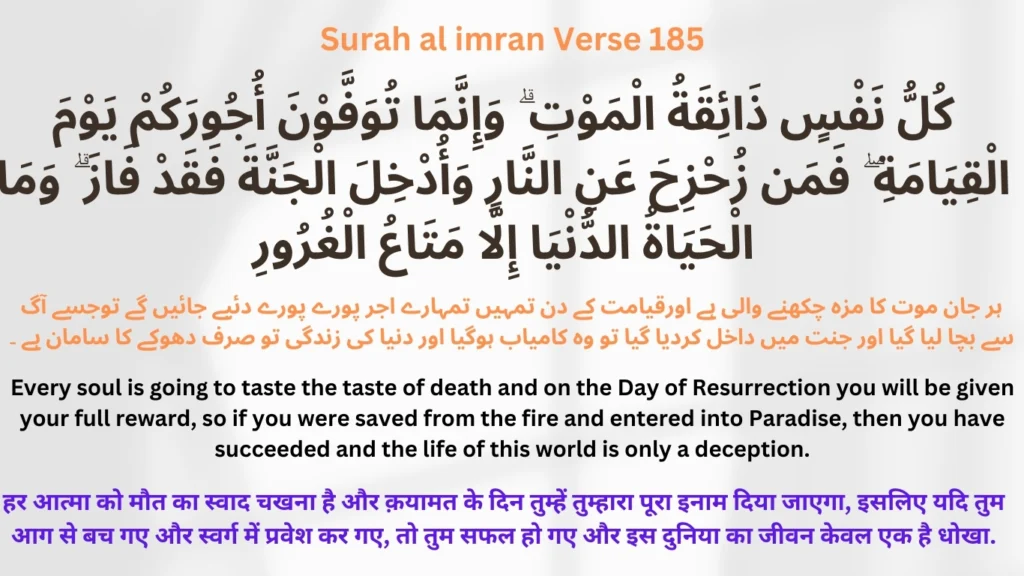Life is a fleeting moment, a temporary existence that leads us to an eternal abode. For Muslims, this understanding is deeply rooted in the teachings of the Quran. Two powerful verses encapsulate the essence of life, death, and what lies beyond Surah Al-Ankabut Ayat 57 and Surah Al-Imran Verse 185. This blog post aims to explore the profound wisdom enshrined in these verses, highlighting the inevitability of death and the promise of eternal reward or punishment. By the end of this article, readers will gain a deeper understanding of these verses and how they shape the Islamic perspective on life and the Hereafter.
Surah al imran Verse 185 Translate in Arabic Urdu Hindi English کل نفس ذائقۃ الموت

Surah Al Ankabut Ayat 57 Urdu Hindi English Translation

Surah Al-Ankabut Ayat 57
“Every soul shall taste death.” This verse from Surah Al-Ankabut succinctly states a universal truth that transcends all boundaries — death is inevitable. Regardless of one’s status, wealth, or power, every human being will face this ultimate reality. It serves as a reminder of our mortality, urging us to live a life of righteousness.
Surah Al-Imran Verse 185
In Surah Al-Imran, the concept is further elaborated, “Everyone is bound to taste death, and you shall receive your full reward on the Day of Resurrection.” This verse not only reiterates the certainty of death but also introduces the idea of divine justice in the Hereafter. It emphasizes that our earthly deeds will be judged, and we will be rewarded or punished accordingly.
The Universality of the Message
These verses resonate with people of all faiths and beliefs, as the concept of mortality is a universal truth. They compel us to reflect on our lives and the legacy we wish to leave behind. Understanding that death is a certainty encourages us to prioritize meaningful actions and relationships.
Temporary Enjoyment
Surah Al-Imran Verse 185 continues, “The life of this world is merely an illusory enjoyment.” This powerful statement shifts our focus from the materialistic pursuits of this world to the everlasting nature of the Hereafter. It warns against becoming overly attached to worldly possessions and pleasures, which are transient and deceptive.
The Deception of Materialism
In today’s consumer-driven society, it’s easy to become ensnared by the allure of wealth, status, and material goods. These verses serve as a wake-up call, reminding us that such pursuits are ephemeral. True success lies in seeking spiritual fulfillment and preparing for the Hereafter.
A Balanced Approach
While the verses caution against materialism, they do not advocate asceticism. Islam encourages a balanced life, where one fulfills their worldly responsibilities while keeping the Hereafter in mind. This balanced approach ensures that we do not lose sight of our ultimate purpose.
Conclusion
In summary, Surah Al-Ankabut Ayat 57 and Surah Al-Imran Verse 185 offer profound insights into the nature of life, death, and the Hereafter. They remind us of the inevitability of death, the illusory nature of worldly life, and the promise of divine justice. By internalizing these teachings, we can lead a life of purpose, prioritize our spiritual well-being, build meaningful relationships, and prepare for the eternal abode.

